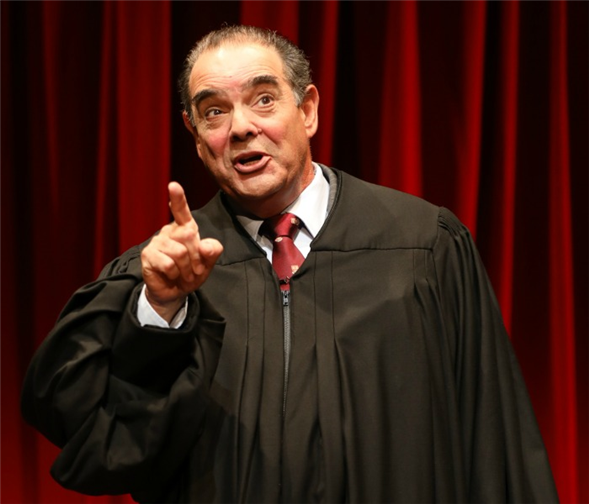Translate Page

The Originalist wants to challenge your perspective on the late Supreme Court Justice
---
Washington, D.C.-based stage actor Edward Gero has tackled a wide range of heavies in his career, from Shakespeare villains to Richard Nixon. But he says he's never felt theatregoers tense up the way they do when he plays famously conservative Supreme Court Justice Antonin Scalia in John Strand's The Originalist, currently running at 59E59 Theaters.
"You go into the theatre -- which is largely going to have liberal thinkers -- and you can feel the audience stiffening," he says. "The opening scene is a lecture Scalia is giving and we leave the house lights on a little. I can see people shaking their heads and cringing, so it is tough. But some people are leaning forward, too."
Gero has been starring in The Originalist since its world premiere at D.C.'s Arena Stage in 2015. At that time the controversial jurist was still alive, the Supreme Court was politically balanced and a Democratic president was in charge. Since then, all of that has changed: Scalia died in 2016, the same year President Trump was elected, and now the Supreme Court is poised to tip to the right, sparking worries that abortion and affirmative action rulings will be overturned.
"Those are the first two issues we talk about in the script," says Gero. "I said to Molly [Smith, the director] that I'm going to need a Kevlar vest when I say in the play, 'I think Roe v. Wade is on its deathbed and I hope and pray that it's overturned.' That puts people's backs against their seats. But that's part of what John's up to. We want to show that part of Scalia so we have a journey to go through in the play, which asks people to question their prejudices."
{Image1}
The three-hander takes place from 2012 to 2013, as Scalia spars with his clerk, Cat (Tracy Ifeachor), a liberal black lesbian who recently finished law school. She in turn debates with fellow clerk Brad (Brett Mack), a young white Republican who's collaborating with Cat on Scalia's dissent in the Windsor case, which ended the U.S.'s gay marriage ban. It's a seriocomic play of ideas and arguments that aims to humanize all its characters -- especially the justice at its center.
"I've been on some panels with judges who thought Scalia had done enormous damage, not only to the legal profession, but to our social and political fabric," says Strand. "I'm not trying to resurrect him or burnish his image, but I do think that he had a human side."
The playwright and Gero were able to see it firsthand when they spent time with Scalia prior to his death. "I was introduced to him and saw him in action on the bench," Gero recalls. "He invited me to lunch in his chambers afterward, and we talked about the role but also other things, like my experience with Shakespeare. At the end of it, he said I was welcome to come back any time and I took him up on the offer and we developed a friendship. He was really quite irresistible, witty and warm. You didn't have to agree with his policies to like him. Why is it that someone like Ruth Bader Ginsburg was his friend [and recently participated in a post-show discussion]? What you do is one thing and who you are is another. I think sometimes we conflate those two and we vilify people with whom we don't agree. That's unfortunate. I think there's an alternative presented in the play about despising someone you disagree with, and yet having something to learn from that other person, too."
Although Scalia opted not to see the production, he and Gero did discuss how theatregoers responded to the show. Gero said that he had played many characters "that audiences love to hate, but this was the first time I played a character that audiences hate to love."
To Gero, that's what makes channeling Scalia so exciting, even after three years of portraying the man. "Actors are empathy machines and we have to find the humanity whether we're playing Iago or Hamlet or Antonin Scalia," he says. "Not to say that they're equivalent morally, but the fact is some of the greatest villains of Shakespeare probably consider themselves greatly misunderstood."
---
Follow Frank Rizzo at @ShowRiz. Follow TDF at @TDFNYC.
Top image: Edward Gero in The Originalist. Photos by Joan Marcus.
TDF Members: Go here to browse our discounts for theatre, dance, and concerts.